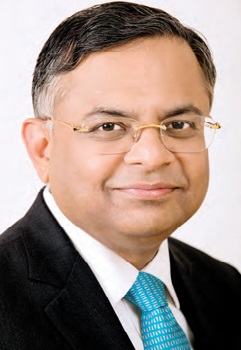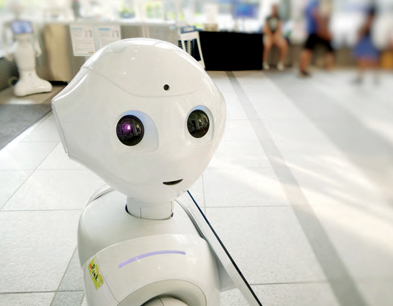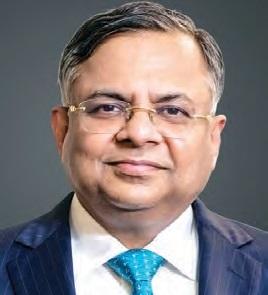Being Future Ready

The current business scenario is changing rapidly. Artificial Intelligence, Machine Learning, Robotics and Automation, are the buzz words in the industry the world over. What needs to be done to be an agile organisation? How can businesses navigate emerging geoeconomic trends? What is required to be future-ready? Were the topics discussed at a recently conducted virtual Business Summit by CII (Confederation of Indian Industry). The panellists of the session were N Chandrasekaran, Chairman, Tata Sons and session moderator, Janmejaya Sinha, Chairman, CII National Committee on Financial Inclusion and Fintech and Chairman-India, The Boston Consulting Group India. Corporate Citizen brings you excerpts from the session
Janmejaya Sinha: I will start by asking you that you had defined your first term by using three words. ‘Scale’, ‘Simplification’ and ‘Synergy’-where are you with these words within the group companies and as you start your second term what word would you add or subtract to this?
 N Chandrasekaran
N Chandrasekaran
N Chandrasekaran: These three have become deeply embedded in all our companies. We have simplified our structures and our simplification efforts are at multiple levels. At a portfolio level or the operating level, our businesses have gotten out of areas which are non-co and have reduced the number of markets or marginal areas where we are operating. We have closed more than 100 subsidiaries in the last few years and synergy has become a core theme. We couldn’t have launched our electric vehicle unless or otherwise, we brought all the group companies together. When the ESL scheme came, we didn’t have an electric vehicle platform, we then decided in August or September to participate and launch our vehicle in January. We brought six or seven companies together under a single roof to be able to create the platform and launch a vehicle. So, ‘Synergy’ has become an important theme. We merged our consumer foods companies to get away from product chemicals and budget. Without a consumer, we merged all our defence efforts into a single company-we were in six different companies so whether it is a simplification or synergy, it is across the group and wherever we are focused on growth, we are scaling it. You will see it in industrial companies like Tata Steel where our India capacity has doubled from 11 million tons to 20 million tons. The production capacity has also increased of passenger cars. In the last three years, our production capacity has almost tripled-in the number of store openings some of our retail formats have tripled the number of stores. You will see the ‘Scale’ efforts playing out everywhere where we are focused on growth. I have not said it in the group but since you asked the question. There are at least two more ‘S’s we will add. We’ll continue on the ‘Simplification’, ‘Synergy’ and ‘Scale’ but will add ‘Sustainability’ and ‘Speed’
I’m going to ask you a personal question which you will have to extend to the group in your answer. You are an avid marathon runner. What lessons does running the marathon give you in running the group? What analogies & ideas can you take from how you prepare and run a marathon to how you talk to your group companies?
Whether it is running a marathon or something else that one is used to if you are spending a significant amount of time on something that will bound to have a huge influence on you and I’ll be honest to say that the best thing that happened to me is running a marathon. Running not only brought health and focus but it has also changed me. It has taught me how each context is different and you’ve got to operate in your context.
It’s good to look at the market, to look at the competition, it’s also good to look at the opportunity but fundamentally, what you do will depend on your context and in a marathon, you know that you’ve got to be fit if you want to perform. There are many aspects of running a marathon that comes to my mind in various walks of my life. For instance, it could be businesses, it could be strategy operations, could be talent and such. The only reason you run the race is that, after 30 kilometres, you give up; actually, the only reason you’re running is everyone else is running, so unless or otherwise, you have that spirit in the company among your colleagues, you will not be able to have aspirational goals. So, there are many things I can talk about but I will leave that for later.
"We have a lot of SMEs in the platform and we are trying to do a couple of things. One is we want to address the financing for SMEs; secondly, we are trying to see what operating skills they need and how we can enhance their productivity, how we can help them participate in a larger pie on the businesses they are doing"
By most beliefs in India, the Tata Group would be perhaps the most ethical group that exists. You have a brand which has some elements that are very clear. You’ve been involved in mission building. The ability to vision at scale, in terms of as a group, you added ‘Speed’ to the five words that are going to come into your next term. What other things would you like your brand to stand for? You know it is well recognised in India that it would perhaps be amongst the top recruiting brands. So, if you project forward what would you add to your brand?

I think we are fortunate to have such a legacy and it’s because of the way the Group has been running and has been envisaged how the purpose should be very deeply ingrained in the Group’s culture and ethos for more than 100 years. The value systems, whether we call ethical values or whether we call it the concern for the society or treating people with dignity and there are various facets of it. These are all deeply ingrained in the Group and it doesn’t take a lot to tell people to be caring. For example, it’s one thing to come up with the program at the Group centre by forming a committee of CEOs but before you do that people are doing the right thing and doing their bit that is very deeply ingrained in the DNA of the Group. So, I always say that it’s the trust that we need to continue to live. I always say it’s not about doing something it is more about continuing on the journey with intensity. You asked me about the brand, I think the Group is known for its ethical standards but at the same time, we have to be driving performance, we also have to become an aspiration for India to be able to do that and that requires doing because with history comes complexity, so we need to continue to be very strong on the foundation that we have on the core values that we have but at the same time adding these extra elements.
In your book, ‘Bridgital Nation’, you raised one of the issues, one of the most important pressing issues in India was the absence of jobs and the fact that there cannot be a healthy India unless most Indians are productively engaged. The biggest sector which is creating jobs today is not a large industry but is SME (Small and Medium Enterprises). What are you going to do with SMEs?
First of all, I just want to be honest to say that we can’t do anything alone. We can be a catalyst, we can play our part and there are certain areas we can take the lead. To my mind, the fundamental problem of jobs is to do with two or three things. One is, that most of the jobs are informal. The second is that the skill levels of people are low hence, we have this concept which we call in the book ‘Missing Middle’.
Firstly, I feel that with the help of AI and other technologies, we can significantly enhance the piloting some of that and definitely, we want to make a big impact by a combination of skills institute and sector by sector wherever we can play a part we will do that. We are looking at healthcare as one of the areas, we’re looking at a number of other industries where we will definitely deploy that particular concept. It will do two things, firstly, it will create more jobs and secondly, it will increase the income levels of the people at the low end by at least 15 per cent is our estimate without accounting for inflation. To add to that, on the smaller medium businesses, we are working on a platform-we are operational already but we are not formally launched. There, we have a lot of SMEs on the platform and we are trying to do three or four things. One is we want to address the financing for SMEs; the second aspect is that we are trying to see what operating skills they need and how we can enhance their productivity, how we can help them participate in a larger pie of the businesses they are doing. So, we have two-three objectives with which we are working on this platform. Once we establish it clearly, we can scale this up. I do believe that addressing the SME needs will unlock not only tremendous growth in the economy but also will address many of the things that we talk about on the quality of life and equality, gap creation, and better paying jobs.
"AI will play an important role in the way you build the businesses, and governments definitely have to do incentives and policies. I think that’s all we can hope for but I really feel that is a big opportunity and there’s a lot of funds available"
One of the things which the Prime Minister of India has talked a lot about and in the context of the Ukraine situation-and in fact, in all, as you have talked about supply chain rebalancing has come to the forefront which is Atmanirbharta (self-reliance). We need to be self-reliant in those areas where the risks are large. In this context, of course, there are things that the government can do and things that industry can do and things that civil society can do. What would you think that industry should do, what do you think that the government should do to catalyse and speed up Atmanirbharta in key areas.

I think this India plus opportunity will happen in every industry. There is no question about it. It will happen across the board as I said, we have looked at position manufacturing, we are looking at semiconductor assembly, we’re looking at batteries, we’re looking at software stack for future telecom technologies and the rest of it.
We are studying healthcare, so these are global opportunities and there will be opportunities in chemicals, pharmacy, and defence, so all of this is going to be a huge opportunity. I think these are bets that people have to make. I feel that a fundamental strength, investment in data and AI is going to be critical to do all of this because each one of these has the advantage of starting afresh so we can do it differently. We don’t have all the things, so what you can do is you can start afresh. AI will play an important role in the way you build these businesses, and governments definitely have to do incentives and policies. I think that’s all we can hope for but I feel that is a big opportunity and there are a lot of funds available. Money is chasing these opportunities, so it’s a question of identifying and making bets and executing, and in India, we just need approvals and everything else that we need and some of these things will require a good environment, clean water, precise geography location etc. There are challenges of that kind which I’m pretty sure everyone is aware but the opportunity is real.
When you were in TCS you had mentioned one thing which had caught my eye in one interview, which was since the speed of change had become so fast that you had reduced the time on spending on building long-term strategies but had wanted to create the organisation to be agile to experiment and to fail fast. Have you been able to spread that outside the TCS in other parts of the group?
I think some of our group companies are pretty strong. And for ‘Agile’, I call it ‘Speed’. I called it ‘Speed’ earlier but because it sounds very well. Every interesting enterprise in addition to being an AI enterprise has to be an agile enterprise as a management consultant, I think you’ll say it all the time but the point I am making is that many of our consumer-facing companies have their culture but in industrial companies, it’s very hard. Having said that, we are doing a lot of pilots, for example, even in Tata Steel, we are looking at new materials in a big way. We are looking at graphene; we’re looking at some composites which are very unique for medical equipment and can make a fundamental difference to those industries so, we are doing multiple incubations. And we will scale up or kill it so we are quite happy to incubate and kill it. And that is something which is very difficult to do for organisations but we are quite happy to do that.
KEYNOTE: N CHANDRASEKARAN
"Our economy has changed beyond recognition in these 75 years. We’ve entered new businesses and have flourished in many sectors. Today, we have the world’s third-largest startup ecosystem. In the year 2022, so far, we have been producing one unicorn every week"

Before we talk about the future, a few words from the past. In the last 75 years since independence, we have come a long way. India, at the time of independence, used to be three per cent of the world’s Gross Domestic Product (GDP). Now, we are about seven per cent of the world’s GDP. Our economy has grown 100 times in these 75 years. In the last 10 years alone, we have lifted about 270 million people out of poverty. Our economy has changed beyond recognition in these 75 years. We’ve entered new businesses and have flourished in many sectors. Today, we have the world’s third-largest startup ecosystem. In the year 2022, so far, we have been producing one unicorn every week. A digital identity is used by 99.7 per cent of the population-there are many such data points to share but still, we have a long way to go. Whether it is in terms of women’s employment, the number of people below the poverty line, access to health care, or access to education for all there are many such things we still need to address.
The recent history has been relentless-first, a global pandemic, identity wars, military conflict, the rise of cryptocurrency, growing inequality, and decades of experience seems to have been squeezed and packaged in a couple of years. Out of all this, the many trends that are emerging will have a big impact on economies, countries and businesses both nationally and globally. There are many trends happening right now but I am going to mention four of them that I feel are most critical. These are mega trends that will shape all of us in businesses and society and I will share a few thoughts on how at the Tata Group, we are looking at the strengths and we are adopting and making the transition and will leverage them to be ready for the future.
The first is the digital adoption from work to health to education to shopping. In the last two years, the internet has penetrated ever further into the daily life of everyone. At the same time, advances in Artificial Intelligence (AI), Cloud and data technology have raced forward already. Proprietary AI and data are separating top-performing companies from the rest-soon, all businesses have to become compliant with AI and data; no industry can escape this trend. However, this development is a huge opportunity for India because of our tech strength we are extremely well placed to reimagine the future; we imagine every industry, and every business to be a data business and AI business. This will really help us to fix the structural problems we have seen in this country but this is not just about preparing for the domestic industry, this is also about playing a big role globally, in every industry and company that we operate in.
The second is the supply chain rebalancing-the supply issues that we experienced during the pandemic and also the supply issues that are arising due to the geopolitical situation whether it is China, the US or the war between Ukraine and Russia. And the global status quo is fundamentally rebalancing the global supply chain. Supply chains have to be designed for resiliency not only for efficiency but also from an Indian perspective-this is a global opportunity for us. I believe India has an important role to fill the void that is getting created in the global supply chain by taking a leadership position and seeing it as a huge opportunity. I call it the India-plus opportunity because we will need partnerships-a supply chain rebalancing also means a rebalancing of global growth-what you will see in the coming decade is that 70 per cent of the world’s growth will come from the emerging markets. We are already seeing this in the immediate year where India’s growth is going to be higher than most countries or almost all countries that you can name, at the same time, India’s inflation, at least I can think of, for a long time is going to be lower than the inflation of the west. It’s a very unique situation we are in.
The third is sustainability, it’s like two trains moving in the opposite direction, on the one side the pressure on making the climate transition is only going to increase pressure on the plan that we have towards making this transition and that will come under pressure so that the deadline will only get advanced. And at the same time, the global support for businesses that are based on new energy sources are going to receive a huge acceptance globally from all stakeholders. Not only investors but from all stakeholders which then will accelerate the momentum, and the move towards electric vehicles, renewable energy sources, hydrogen batteries and storage solutions, water efficiency; not only water neutrality, but circular economy solutions also, so that the waste management can be effective because we don’t want to create future problems while we make a transition. All of this is going to happen and it will require a unique startup ecosystem in India for new technological breakthroughs and India needs to participate in that. We’ve done it in technology, we’re doing it in the fintech sector, we’ve seen some of it in the telecom sector. We have a huge opportunity to play a pivotal role in bringing these technologies, be it materials or be it energy, I think that is a tremendous business opportunity. Companies will have to think more about health-related, wellness-related value propositions that matter in all industries. You will see those value propositions even in those industries which will seemingly look unconnected to health, safety and convenience will be central to any consumer business.

Going forward, the next trend is going to be regarding the global talent pool where there is going to be a lot of challenges in attracting talent and the models have to shift away from the traditional models. There will be new technology platforms to engage with talent and sort of a talent cloud. The concept is to have the ability to access talent 24x7 from any part of the world. Skills will become far more important than expensive formal education. The whole talent architecture will change not only in the services industry but across all industries because even in manufacturing, there is going to be advanced manufacturing, a new way of manufacturing products, wherein robots and bots will play a significant role.
At the Tata Group, we are undergoing a massive transformation to become future-ready. We have addressed our balance sheet issues; companies are very fit, and we are seeing revenue growth, profitability growth, and more importantly, cash flow growth across the system. We are transforming our core businesses to be future-ready. A transition, where we are tightly integrating or embedding digital data, AI and sustainability at the core of the business, be it in strategy, and most importantly, in the business model itself. And we are creating new businesses to address the supply chain rebalancing opportunity. In terms of transition, our auto company has made a significant transition in passenger cars. In fact, our market shares have gone up because we made this transition. In commercial vehicles, we’re looking at hydrogen fuel cells; we’re doing the same thing for Jaguar and Land Rover. Our power company is shifting heavily towards not only utility-scale renewables but also consumer renewables and we are doing the same thing with steel not only in terms of recycling but also in terms of preparing a blueprint for hydrogen. We are also into carbon capture. Water is a big theme across the Tata Group where everyone and every company will not only become water neutral but we’ll go beyond that. We have a group-level agenda on sustainability which we’ll be announcing shortly where we have a group-level goal towards becoming carbon neutral but at the same time, we will address a huge impact that we can create on communities.
In terms of new businesses, we launched our super app to prepare ourselves for an omni-channel digital consumer-facing ecosystem. We have launched a very large-scale precision manufacturing electronics company which has global aspirations. We have launched a company for creating a 5G and beyond telecom gear for the global markets and we are preparing the blueprint to launch our battery company both in India and abroad, and we have a big job to do in transforming the national airline.